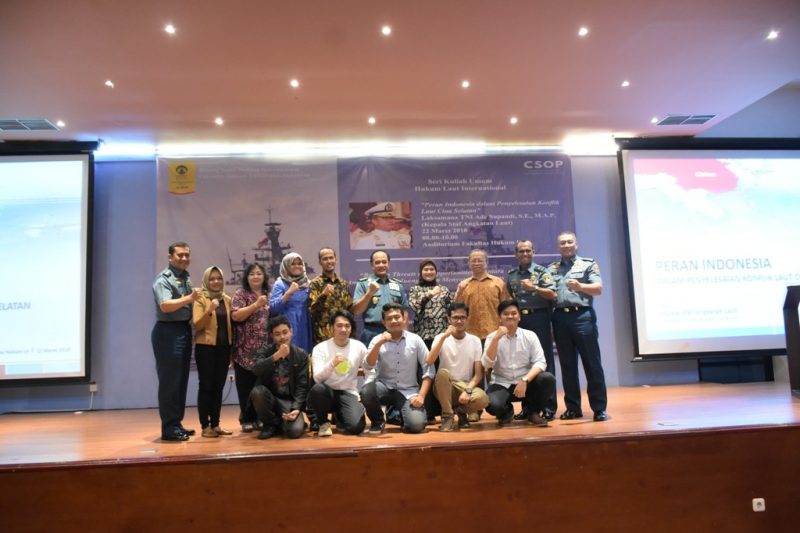The Role of Indonesia as the Largest Archipelagic State in the World
The Research Cluster for Sustainable Ocean Policy (CSOP) organizes Public Lecture Series in International Law of the Sea. The Public Lecture Series is divided into two series, the first “The Role of Indonesia as the Largest Archipelagic State in the World” and the second “Between Threats and Opportunities in Welcoming the World Maritime Axis”.
For Public Lecture Series, “The Role of Indonesia as the Largest Archipelagic State in the World” was delivered by Admiral Ade Supandi, S.E., M.A.P. (Chief of Staff of the Indonesian Navy) on Thursday, March 22, 2018 at Auditorium Djokosoetono FHUI, Campus UI Depok.
In his speech, the Dean of FHUI Prof. Melda Kamil Ariadno, S.H, LL. M., Ph. D. said that students on campus so far only learned the theory and the principle which is incomplete because we have to know how the theories and principles are alive, realized and implemented in the field.
“With this Public Lecture Series, we hope to get enlightenment and knowledge of how the theories and principles that have been studied in the campus life is realized and implemented in the field,” said Prof. Melda.
As the general public knows, the largest maritime conflict today is the South China Sea conflict. The South China Sea is a strategic area bordering Brunei Darussalam, the Philippines, Indonesia, Malaysia, Singapore, Vietnam and China. In some parts, there are overlapping jurisdictions between claimant states (Brunei Darussalam, Philippines, Malaysia, Singapore, Vietnam, and China) which make the conflict potential in this region quite high.
Indonesia is not one of the parties claiming territorial ownership in the South China Sea, but the South China Sea conflict will affect Indonesia’s security and sovereignty.
Admiral Ade Supandi, S.E., M.A.P. explained that Indonesia is attempting to resolve the dispute in the South China Sea by conducting several activities, such as initiating joint patrols in the South China Sea, mediating the Declaration of Conduct (DOC) negotiations with other ASEAN countries.
“70% of the earth’s surface is covered with water, 90% of world trade by sea, the impact of the South China Sea conflict will be overwhelming.” Said Admiral Ade Supandi, S.E., M.A.P.
To that end, Indonesia continues to maintain the territorial integrity of Indonesia and maintain the stability of the region. To strengthen diplomacy, the Indonesian National Navy (TNI AL) organized the 15th Western Pacific Naval Symposium (15th WPNS) 2016.
The purpose of this activity is to enhance cooperation and capability in the implementation of the Navy’s daily operations of WPNS members to build mutual trust between the Navy through a framework for discussion of maritime issues in terms of common interests, information exchange, training and exchange of personnel. The appointment of the Indonesian National Navy as the organizer of the 15th Western Pacific Naval Symposium (15th WPNS) 2016, was the result of the decision on the implementation of 14th WPNS 2014 which was implemented in Qingdao, in 2014. Where the Chief of Staff of the Navy (Kasal) was appointed to be the Chairman of the 15th WPNS.
This upcoming May, a number of warships from several countries will be ready to dock to the shores of Lombok on May 5-8, 2018. It is estimated that four thousand navy personnel participated in the Multilateral Naval Exercise (MNEX) Komodo 2018.
MNEX is a non-combat exercise that puts more emphasis on naval diplomacy exercises between countries in the bordering regions. MNEX aims to enhance the cooperation of maritime diplomacy between countries in strengthening the world’s maritime axis.

